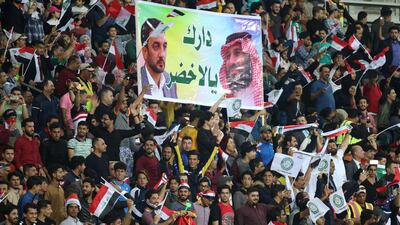For most people, watching your international team compete in a major sporting event is accompanied by excitement, silent prayers for success and sheer joy or sadness at winning or losing. However, for Iraqis in the 1990s, the overriding emotion was fear. Saddam Hussein’s elder and most brutal son, Uday Hussein, was notorious for punishing competing athletes or sportsmen (few women competed) if they lost. He was appointed head of the Iraqi FA from 1990 until 2003, making it impossible for the football association to advance. The more the threats of punishment increased, the more difficult it became for Iraqi sports to excel. And so, fans would watch games with trepidation, while reports of torture cells at the Iraqi Olympic Association haunted many.
Today, the situation is markedly different. No longer are Iraq’s footballers or athletes under the threat of such state brutality. And yet their security, and that of their fans, was undermined by the violence that has plagued the country since 2003, as all aspects of life have been. One devastating attack in March 2016, led to the death of 29 people and injury of 60 others (many of whom were children) as a suicide bomber blew himself up in a football stadium, south of Baghdad. Fears of security breaches have led to limited sporting events in Iraq, and as the country works on lifting itself out of the cycles of violence, sporting events are emerging as a vital litmus test.
Iraq has a long history with international sporting events – a source of pride for many Iraqis. Iraqi athletes competed in the 1948 London Olympics and Iraq’s Football Association has been a member of Fifa since 1950. After years of sanctions, bans and isolation, in 2018, Iraqis want to say they are back in the game.
_______________
Read more from Mina Al-Oraibi
Fifteen years on from Colin Powell's speech, Iraqis are still picking up the pieces
Reconstruction isn't just about rebuilding Iraq, it is an exercise in nation-building too
The story of Idlib is being rewritten by the Syrian regime, but facts matter
_______________
Football has been vital for a country seeking to reinstate its confidence. Iraq’s historic win in the 2007 AFC Asian Cup, defeating Saudi Arabia 1-0, could not have come at a better time. The historic win was at the height of sectarian and civil strife ravaging the country, when many predicted the break-up of Iraq. As the country’s national identity was put under incredible strain, suddenly Iraqis were coming together under the banner of the Lions of Mesopotamia (Usood AlRafidayn), as Iraq’s football team is popularly known.
In the last few months, as Iraq seeks to re-establish ties with its Arab neighbours, football has again played a vital role. First hosting Jordan in a friendly, and then historically hosting Saudi Arabia last week, Iraqi youth are reconnecting with the wider Arab world through their shared love of football. It was the first time in close to 40 years that Iraq played against Saudi Arabia on home turf. The 65,000 seats at the Basra Sports City Stadium were nearly sold out, with fans from all over the country attending the game. Accompanying the game were messages of shared love and respect between fans of the two countries. While the head of Saudi sports authority Turki AlShaikh posted messages of Iraqi songs, accompanied by rare love emojis, Iraqi television commentators repeated that Saudi Arabia "won the love of Iraqis", despite losing 4-1 in the actual game.
In the past few weeks, regional sporting figures have been rallying around Iraq and championing the country, a development that is key to bridging people-to-people ties. Prince Ali bin AlHussein has emerged as a vital voice supporting Iraqi football. His visit to Basra, accompanying the Jordanian football team in a friendly last June, was a vital endorsement. Sheikh Salman bin Ibrahim Al Khalifa, head of Asian football, has called on Fifa to allow Iraq to come back into the fold of countries hosting international games. Having prominent Arabs in the sporting world come to the defence of Iraq is part of a wider Arab opening up to Iraq that is much needed.
Later this month, Fifa will consider whether to lift the ban on hosting competitive international games imposed on Iraq since the Kuwait invasion of 1990. The matter is not based solely on security, but also on the logistical ability. When the ban was temporarily lifted in 2011, an electric outage made the international sporting body question Iraq’s ability to host competitive games and reinstated the ban. In 2009, Fifa temporarily suspended the Iraqi FA "due to government interference" to the dismay of Iraqi football lovers. Since then, an earnest effort has been made to overcome these challenges. A whole generation of Iraqis has grown up without the joy of supporting their national team in international games – and their enthusiasm last week again proves they are ready to do so.


